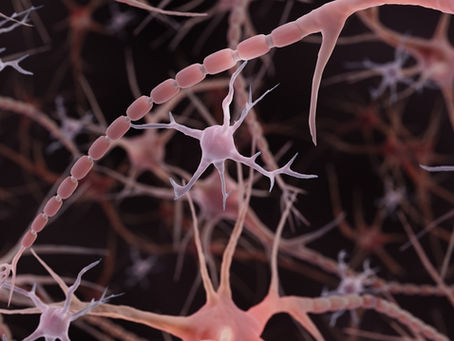top of page
BCIA Continuing Education Posts
The BioSource Faculty Explain Peer-Reviewed Science


Parkinson's Disease as a SCAN Disorder
The central discovery is that M1 is not simply a mosaic of body-part territories. Woven among those effector-specific zones (the patches that control the hand, the foot, the mouth) lies a second system called the somato-cognitive action network, or SCAN.
Fred Shaffer
Feb 1212 min read


On the Same Wavelength: How Brain Similarity Predicts Who Becomes Friends
Neural similarity measured when people were still near-strangers predicted who ended up socially closer in a real friendship network months later.
Fred Shaffer
Dec 4, 20259 min read


Five Phases of Brain Wiring: How Your Neural Networks Change From Birth to Old Age
The brain's wiring passes through a series of turning points that divide the lifespan into five distinct phases.
Fred Shaffer
Nov 27, 20259 min read


5-Second Science: Connectome 2.0 Achieves Live Near-Microscopic Brain Imaging
Vivid images reveal individual axons and even cell bodies, while a person is awake and breathing.
Fred Shaffer
Sep 1, 20254 min read


5-Min Science: Deep Sleep Clears Toxic Proteins
Alzheimer's disease, Parkinson's, and other neurodegenerative conditions involve the accumulation of toxic proteins that the glymphatic system is designed to clear.
Fred Shaffer
Aug 31, 20258 min read


A Second Look at Adult Brain Reorganization After Amputation
Brain maps that had been carved by decades of hand use didn't simply vanish when the physical hand disappeared.
Fred Shaffer
Aug 26, 20258 min read


5-Min Science: Oxytocin - From Moral to Flexibility Molecule
Oxytocin can promote envy, schadenfreude, discrimination, and punishment depending on context.
Fred Shaffer
Aug 25, 202512 min read


A Second Look: Schachter and Singer's Two-Factor Theory of Emotion
Fear, anger, disgust, and sadness often carry partially distinct autonomic fingerprints.
Fred Shaffer
Aug 9, 20259 min read


5-Min Science: When Your Immune System Hijacks Your Mind
Studies suggest that between 1% and 5% of people diagnosed with schizophrenia actually have autoimmune conditions.
Fred Shaffer
Aug 8, 202514 min read


5-Min Science: Lithium Deficiency May Be an Early Alzheimer's Driver
The brain needs tiny amounts of lithium to stay healthy, and people with Alzheimer's don't have enough of it.
Fred Shaffer
Aug 7, 20257 min read


5-Minute Science: Alzheimer's Risks Can Be Reduced by Lifestyle Changes
The US POINTER trial reveals that older adults can boost their brain health through targeted, structured lifestyle changes.
Fred Shaffer
Jul 30, 20256 min read


5-Second Science: How Your Brain Wakes Up From Sleep
The brain follows a consistent pattern when transitioning from sleep, with specific rhythms and regions activating in a predictable sequence. These changes vary depending on the sleep stage and even predict how alert or sleepy a person feels upon waking.
Fred Shaffer
Jul 22, 20255 min read


5-Second Science: Common Viruses May Contribute to Parkinson's Disease
Researchers found human pegivirus (HPgV) in the brains of individuals with Parkinson’s disease, but not in healthy controls.
Fred Shaffer
Jul 22, 20255 min read


5-Second Science: Optimists' Brain Activity is Unique
Optimistic individuals share similar patterns of brain activity when imagining the future.
Fred Shaffer
Jul 22, 20256 min read


5-Min Science: Human Neurogenesis Confirmed
A groundbreaking study published by an international team of researchers led by Jonas Frisén at the Karolinska Institutet in Stockholm has finally provided compelling evidence that yes, adult human brains do indeed grow new neurons
Fred Shaffer
Jul 11, 20257 min read


5-Min Science: Brain Structural Differences Precede Substance Use
Children who later initiated substance use had larger brains overall, including greater whole brain volume, larger cortical surface area, and bigger subcortical structures.
Fred Shaffer
Jul 10, 202514 min read


5-Min Science: Your Brain Emits Biophotons
The idea that the brain might not just glow but use this glow as part of its signaling has remained speculative—until now.
Fred Shaffer
Jun 16, 20257 min read


5-Min Science: How We Distinguish Reality from Imagination
Dijkstra and colleagues identified a specific neural mechanism that our brains use to distinguish the vivid world of our imagination from the tangible reality we perceive through our senses.
Fred Shaffer
Jun 11, 20254 min read


5-Min Science: The Paradox of ADHD
At its core, ADHD is not about lacking attention—it's about struggling to control it.

Zachary Meehan
May 28, 202511 min read


5-Min Science: Are Mitochondria the Cell's Motherboard?
Mitochondria are not merely energy producers but orchestrate complex cellular processes, including gene expression, apoptosis, calcium regulation, communication, and synaptic function, especially in neurons.
Fred Shaffer
May 23, 202517 min read
bottom of page
